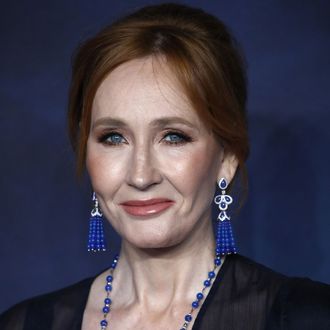
Whatever the opposite of Pride is, that’s what J.K. Rowling has been observing. The Harry Potter author has taken her anti-trans comments off Twitter and written a 3,670-word blog post explaining herself. Like half of her books, it’s simply too long, so let’s run through. Rowling begins by outlining her “interest in trans issues,” which she says came nearly two years before she sided with Maya Forstater, a cisgender woman who lost her job for anti-trans tweets, last December. “On one level, my interest in this issue has been professional, because I’m writing a crime series, set in the present day, and my fictional female detective is of an age to be interested in, and affected by, these issues herself,” she writes. We’re no detectives, but it sounds like her detective might be a TERF too. By Rowling’s estimate, supporting Forstater led to her “fourth or fifth cancellation” — but afterward, she says, she received letters of support “showering down upon me.” She recently got back on Twitter “only” to promote a free children’s book, meaning that criticizing the term “people who menstruate” must be some new marketing technique. And soon enough, she was called a TERF, or trans-exclusionary radical feminist — which she doesn’t deny, although she says many people who get called TERFs “have never been radical feminists.” She continues, “Ironically, radical feminists aren’t even trans-exclusionary — they include trans men in their feminism, because they were born women.” As if we need to say, that’s not how it works, because trans men … aren’t women, they’re men.
Which brings us to Rowling’s “five reasons for being worried about the new trans activism.” A quick rundown:
1. “I have a charitable trust that focuses on alleviating social deprivation in Scotland, with a particular emphasis on women and children,” Rowling writes, adding that she worries the acceptance of transgender people will “erode the legal definition of sex and replace it with gender.” Scientists and scholars, of course, maintain that sex and gender are two different, both important things.
2. “I’m an ex-teacher and the founder of a children’s charity, which gives me an interest in both education and safeguarding,” she says without much elaboration. Statistics show trans students feel significantly more unsafe at school than their cisgender peers.
3. “As a much-banned author, I’m interested in freedom of speech and have publicly defended it, even unto Donald Trump,” she writes. This is true, and we’ll just let it sit there.
4. “I’m concerned about the huge explosion in young women wishing to transition and also about the increasing numbers who seem to be detransitioning,” Rowling claims, without citing sources. This is “personal,” she says, as she goes on to hawk many debunked TERF arguments that don’t need to be rehashed here. In the middle of it all, she writes, “I’ve wondered whether, if I’d been born 30 years later, I too might have tried to transition” in the name of “escaping womanhood,” erasing the discrimination trans men face on a daily basis.
5. “I’ve been in the public eye now for over twenty years and have never talked publicly about being a domestic abuse and sexual assault survivor,” she writes. Rowling says she’s not trying “to garner sympathy,” but to voice “concerns around single-sex spaces.” She understands that trans women face increased threats of violence and wants them to be safe, she writes, but she does “not want to make natal girls and women less safe.” Along with there being no proven threat from allowing trans women to use their proper bathrooms, this does sound like textbook trans exclusion.
Anyway, Rowling concludes by doubling down on her beliefs, writing, “The supreme irony is that the attempt to silence women with the word ‘TERF’ may have pushed more young women towards radical feminism than the movement’s seen in decades.” According to reports, young people are among the most accepting of trans rights, while the rise of TERF ideas has led some feminists to call for more trans inclusion in the movement. If you need to laugh amid all this, know that Rowling says one critic told her, “You are Voldemort.” And know that Harry Potter star Daniel Radcliffe and Fantastic Beasts star Eddie Redmayne are fighting the dark arts that are Rowling’s anti-trans mental gymnastics. For the rest of us, there are other trans-inclusion issues at hand.


